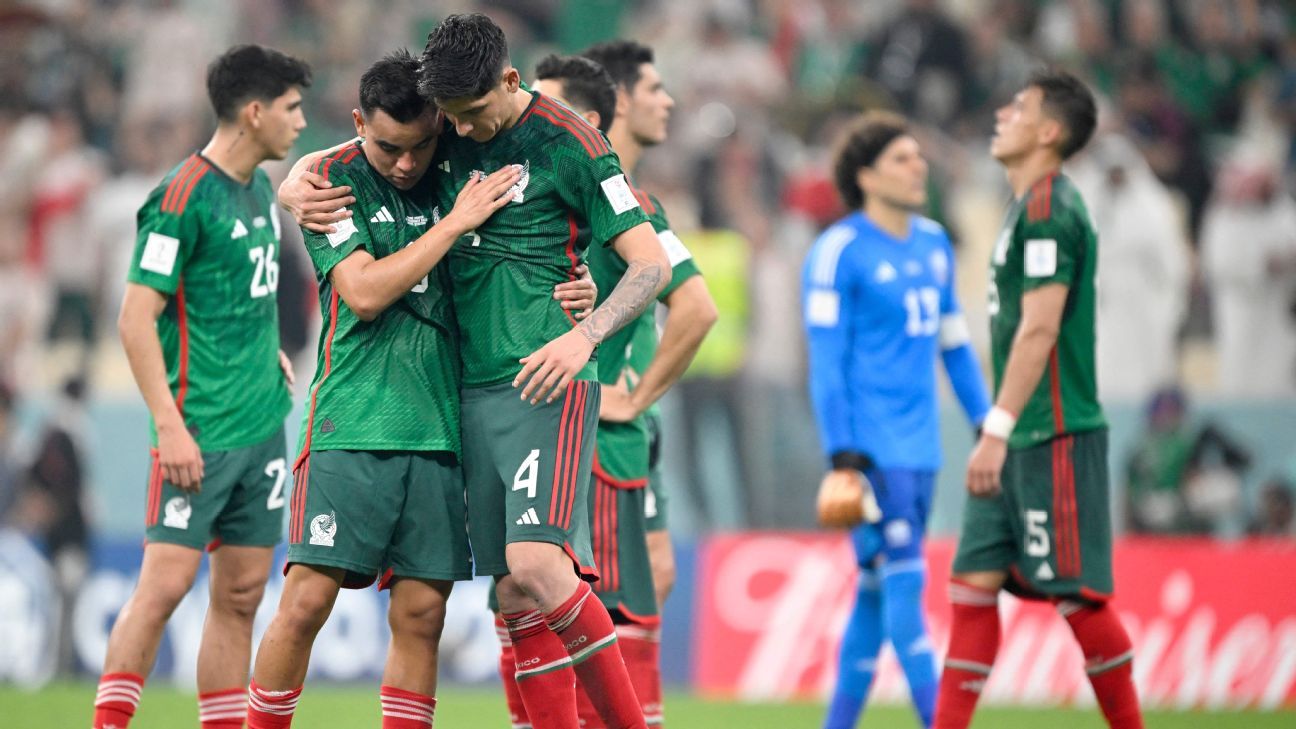Products You May Like
Mexican Football Federation president Yon de Luisa and his Liga MX counterpart Mikel Arriola revealed a detailed roadmap and list of proposed changes to Mexican soccer on Tuesday.
The announcement comes on the heels of a disappointing year for both the men’s and women’s national teams — the low point of which was a group stage exit for El Tri in Qatar.
“What happened for the national teams in 2022, was very serious. Today, we meet to announce the new stage of restructuring,” said De Luisa.
– Stream on ESPN+: LaLiga, Bundesliga, more (U.S.)
With an eye towards the 2026 World Cup, which Mexico will co-host with the United States and Canada, the two presidents shared details of a recently formed national team committee, a new executive director of national teams in Rodrigo Ares de Parga, and an aim to face “high-level” opponents and schedule a 2025 summer competition for El Tri’s senior squad.
The national team committee — made up of Liga MX club leadership from Chivas, Santos Laguna, Club America, Necaxa, Club Tijuana and the FMF president — will support De Parga in the process of finding a new men’s coach. Since the departure of Gerardo “Tata” Martino immediately after the group stage exit in the World Cup, Mexico has yet to find a replacement.
“There is no specific date, we hope it’ll be soon,” De Luisa said about a possible decision to announce a men’s manager, later noting that there’s a possibility a coach will be named next week while ruling out the idea of an interim appointment.
At the Liga MX level, Arriola revealed a long list of proposals that have yet to be officially confirmed by club owners, who will meet in May. Although the league leaders will need to vote on the ideas, Arriola claimed that there is a “great openness” to his plan.
If ratified, whether it be individually or as a full package, proposals such as going back to only eight playoff invitations instead of 12, decreasing the amount of foreign players per roster from eight to seven, and establishing a new trophy for year-long results, could all be in place as soon as the 2023-24 season.
Regarding the new trophy, Arriola’s idea is to hold onto the current Liga MX format with two seasons and playoffs per year, but with a separate championship earned for the cumulative total of points in the Apertura and Clausura.
Other motions, if approved, could take more time. Arriola wants to bring promotion and relegation back, but also highlighted that only one second division team, Leones Negros, is approved to be eligible for promotion. In order for promotion to first return to Liga MX, a minimum of four second division teams need to be approved. More eligible clubs could be announced by May.
Another idea that Arriola wants to tackle is ending the practice of single entities owning multiple clubs within Mexico. However, he did not provide a timeline for reaching that goal.
“What we need to take care of and assure to the assembly [of Mexican clubs] is that it’ll be an organized process, and that it’ll start, without a doubt, as a process that maximizes the value of the teams,” said the Liga MX president.
At the moment there are three ownership groups that own a majority of six teams: Grupo Pachuca (Pachuca and Leon), Grupo Orlegi (Santos Laguna and Atlas), and Grupo Caliente (Club Tijuana and Queretaro).
According to Arriola, tournaments like the expanded Leagues Cup with MLS and the recent partnership between CONCACAF and CONMEBOL will help increase perceived club value to possible new investors.
The CONMEBOL partnership announced last Friday will showcase a Copa America in the United States in 2024, a women’s CONCACAF W Gold Cup tournament with South American invitations, and a “final-four” club competition that will involve two men’s teams from each confederation.
When asked if this could also mean a return for Liga MX to the Copa Libertadores in the future, Arriola said that the “door has been opened” to the possibility down the line.
An additional project presented by Arriola was aiding in the process of sending domestic players to European clubs. In the hopes of avoiding the inflated fees that exist in Mexico’s transfer market, Liga MX’s president will push for more teams to have affiliations with European clubs in order to potentially move domestic talents at a younger age.
Arriola noted that the league and FMF will also “invest resources” to help moves abroad, such as incentivizing teams whose players move to Europe and helping individuals with the process of obtaining a passport.
“This is a before and after,” said Arriola about the outline from the FMF and Liga MX. “Everyone has been asking for what was announced today.”
Mexican soccer has lived in a tumultuous period that began with the senior men’s national team losing the Gold Cup final and the inaugural CONCACAF Nations League final in 2021, both to the United States.
After then failing to qualify for the 2023 Women’s World Cup, the 2023 U20 men’s World Cup, and the 2024 Olympics for both the men’s and women’s teams, Mexico’s first stage of restructuring began last summer with the firings of general sporting director Gerardo Torrado, sporting director of national teams Ignacio Hierro, women’s national team manager Monica Vergara and men’s U20 coach Luis Perez.
Since then, they’ve hired Andrea Rodebaugh as the new sporting director for women’s national teams, Pedro Lopez as the women’s national team coach, and Jaime Ordiales as the sporting director for men’s national teams, alongside the recent employment of De Parga as executive director of national teams.
